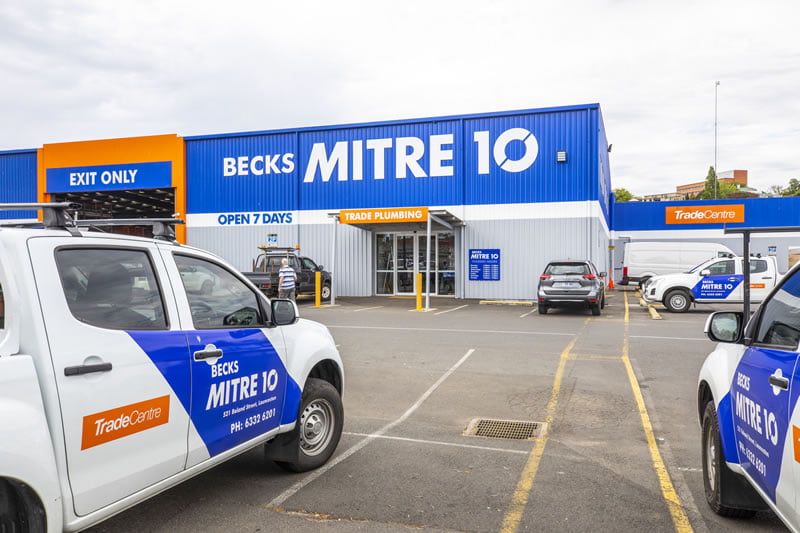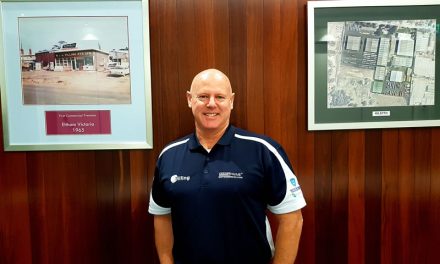The Stage 4 lockdown in Melbourne is the biggest in Australia so far, but it’s not the first. Here’s how one big hardware team in the Burnie region managed their experience.
Melbourne’s Stage 4 restrictions this week have been simultaneously a shock and no surprise. They are anything but easy, but if the experience in Tasmania’s Burnie region, which went into Stage 4 back in April, is anything to go by, they can be the circuit-breaker that stops ballooning community transmission.
Back in the July issue of TTN, we spoke with Paul Connolly, general manager of the Becks Mitre 10 chain of stores across the north and north-west coast of Tasmania about working through the area’s Category 4 Covid-19 lockdown. The interview was done about a month or so after restrictions were lifted, so they’d had time to see some of the recovery by then. We’re re-running an edited version below, which contains useful and encouraging details for any Melbourne retailers in similar positions.
While the public discussion often centres on big-box chain stores, most timber retailers and hardware stores in Australia are family businesses, often generational. Facing a crisis like lockdowns has a much bigger impact at that level. Keeping building sites open, even at scaled-back levels, will help, as the Becks team found, and the crisis can even become an opportunity to remind the local retail customer base that they have locally owned options who can deliver for them, literally as well as metaphorically.
For those in the Independent Hardware Group (IHG) network, the Tasmanian experience has formed a blueprint for Melbourne (and for future Stage 4’s – we will be astonishingly lucky if this is the last one across the country). Bridget O’Connor, Communications & Events Manager for IHG, says that IHG had begun preplanning before that shutdown, “but it has absolutely formed a case study for what we’re doing to support our store owners in Melbourne now and what we can do if needed elsewhere. We learned a lot from the Becks experience.”
One big shift has been the IHG network speeding up the rollout of their home delivery service, which had always been planned for this year, but which had originally been intended as a soft launch that would be extended as it was refined. “Now it’s been launched across the network nationally,” O’Connor says. “It may not be perfect straight away, but we’re setting up a customer service team that will work closely with the stores to ensure a positive consumer experience. Many of our stores were already dabbling in local delivery options for retail customers, this program allows us to adopt a national approach that meets consumer expectations around a full service eCommerce offer.”
Tasmanian lockdown
“We were doing so well…” Connolly says, ruefully. But in early April a significant Covid outbreak in the Burnie region led to a Category 4 lockdown of the region.
“The announcement came at about four o’clock on Easter Sunday,” Connolly says. “We quickly got the store managers and trade account managers on the phone. The operations manager, Donna Bailey, and I rang them and said ‘Look, we’re going to close on Monday, and we’ll get together and discuss what to do next.’ The good news was that it was a public holiday, so only a couple of stores would normally have opened anyway.”
Connolly and his team had been watching the unfolding situation nervously before this. His daughter had been studying in The Netherlands and he had been planning a European holiday in May, so he had been keeping a close eye on developments.
“In the early days, it became obvious it was more than just another flu, but we didn’t know exactly how things were going to develop,” says Connolly. “We in the senior management had store managers across our 10 sites dial in to a weekly conference call and talk about what was going on in their local towns, what the government was saying we needed to do and how to implement that.
“There was a lot – so we took some of it off their shoulders, including simple but time-consuming things: we made sure we had a list of every staff member and all their contact numbers. We gave the teams folders with all the contacts and all the relevant information that have been coming through from the government or from IHG. So when the worst did happen, it was all there.”
Fast forward to Easter and the group were able to make decisions and communicate them to staff quickly. They decided to open the main Devonport store on Monday for a few hours for trade customers. Meanwhile, the managers were on a conference call with the IHG executive leadership team.
“We’d already had our ‘pre-planning’ ratified within our own group. So we went through that with the exec team. They confirmed we were doing the right thing and provided the support that we needed at the time to make sure we could get on with it.”
Tasmanian Premier Peter Gutwein had first announced that all retail would close except for deliveries across the north-west region. Exceptions were put in place for tradespeople and essential services. “Jarrad Murfet, the trade sales manager, and his trade account managers immediately rang all their key customers to let them know what we were doing,” Connolly says. “We were really open and transparent with them as well about what we could do and what we couldn’t do.”
In the following days, that was updated to include agricultural customers and ABN holders such as hotels: “They might not be tradies, but they’ll have a handyman on staff and this was an ideal time to do repairs,” says Connolly. “So we added them to the list at our ‘Checkpoint Charlie’ trade centres.”
Checking in and out
Connolly’s team decided to close access to the retail parts of the stores and check customers’ credentials at entry through the trade areas. “This was a huge difference to what had been happening up till that point,” he says. “We’d had social distancing for some time, but that was just signage, directional traffic within the store and having staff limit the number of people in each store. We were actually really busy, particularly on weekends, because people who were on the lighter lockdowns could still come to a hardware store or use the Click’n’Collect to have an order waiting for them.”
Overnight that changed. For the trade side, it wasn’t a huge difference. Much of the stores’ trade output is usually delivered, and there was little change. “Though lot of our trade customers had put in place their own Covid-safe processes on their sites,” says Connolly. “They weren’t keen to have lots of people coming on site at any one time. ”
But for the retail side, it was a massive change, and the north-west team realised it would have a big impact on their customers. The small regional towns they operate across didn’t have the ready access to deliveries of big urban areas. “So we offered up a free delivery service,” says Connolly. “Our utes and trucks were already on the road, so we did everything from light globes to decking. In the three weeks of lockdown, we did nearly 1000 free deliveries into the local communities we serve. Didn’t matter whether it was $5 or $500, we still did it.”
Learning from crises
Faced with no clear end to Covid restrictions and an uncertain economic outlook, Connolly was surprisingly upbeat: “Building is still strong here. Tassie’s had a good economy of late. That’s softened what’s potentially going to happen in the future. We don’t have the very big builders operating here, so that’s also probably helping us in the marketplace.”
He puts a lot of the credit for the businesses succeeding down to his staff. Even with uncertainty – including some who were in quarantine because of links to the two hospitals with Covid outbreaks – Connolly says, “What happened in those three weeks was the people that work in our business did a magnificent job under a really stressful situation. They pulled together really well. And I hope that spirit and that cooperation can continue on.”
Several aspects of the Covid era will be kept on after the crisis passes. During the worst of the Category 4 lockdown, Connolly was running conference calls twice a week, rotating through store managers, department managers and team members.
“We were conveying a top-down message out to everyone, to keep it consistent,” he says, “but we got to hear responses from multiple voices and that’s been good for us. One other nice thing is that a lot of those online and phone meetings happen in people’s homes and it humanises everyone: you get a look into their homes, you hear their pets and their kids.”
While the Tasmanian stores did lose revenue during the serious lockdown, it bounced back the day they were able to fully open. “People were out in force, and it’s been that way since,” says Connolly. “Partly because there’s only been a certain amount of businesses open, but I think it’s also because we did do some of those things that made people feel better-connected to our business. I think they appreciated those free deliveries across our six regional stores.”
Other positive outcomes include a better approach to sickness, with staff being more likely to take leave to protect their colleagues and social distancing helping to reduce seasonal colds and flu as well as Covid.
Even the Category 4 lockdown wasn’t as bad as Connolly’s team had expected. He says, “Isolating the region was pretty tough, but it was the right thing to do and because the efficient way our governments reported and communicated, we could see that they were getting it under control.”
While he wouldn’t want to go through it again, he’s sure they could.
For more on IHG’s delivery options, visit www.mitre10.com.au and www.homehardware.com.au
Image: During the north-west Tasmania Category 4 lockdown, only trade customers, farmers and ABN holders were allowed into Burnie’s Becks Mitre 10 stores.












